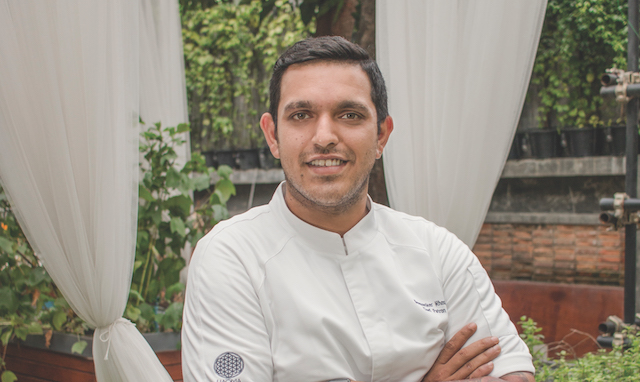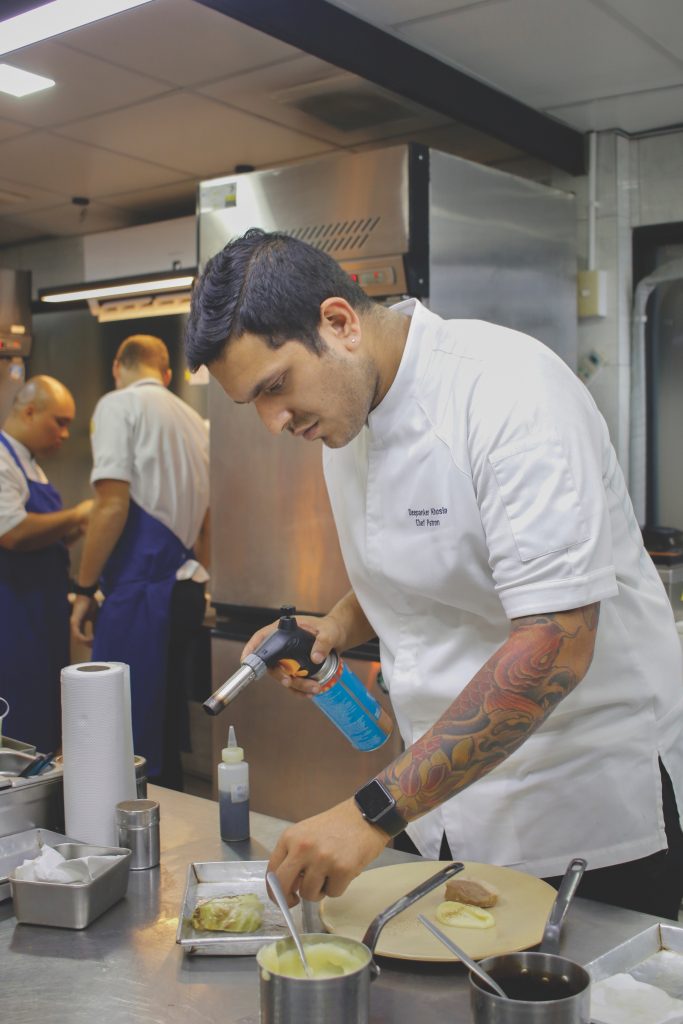Uncover Chef Deepanker ‘DK’ Khosla’s remarkable culinary journey.
By Ashima Sethi
The farm-to-table philosophy has become an increasingly familiar concept among Bangkok’s food enthusiasts, however Haoma takes it a step further by bringing their tables directly to the farm. Situated on bustling Sukhumvit Soi 31, the restaurant is the brainchild of celebrated Chef Deepanker ‘DK’ Khosla, who successfully combined elements of fine dining with an urban farm experience. Here diners sit amidst lush gardens where fresh produce is grown and used as ingredients. This is just one of the many eco-friendly ways in which Chef DK has chosen to run his establishment, named after the mythological ‘Tree of Life’ in Zoroastrianism. The impressive mini ecosystem was curated based on his profound knowledge of seasonal produce and his unwavering passion for sustainability. This culinary pioneer reveals more about his ambitious goals, as well as the future of sustainable cooking.
As a now celebrated chef, was it always your dream to pursue a career in the restaurant scene?
I come from a very orthodox background. My school in Allahabad, India, only offered a handful of subjects, including math and biology, so for a long time, the only realistic career options were engineering or medicine. I always had dreams of joining the armed forces, but when I didn’t make it, my mother encouraged me to start hotel school, where I soon realised that every position, apart from being a chef, involved wearing a suit and smiling at people. So I chose a kitchen position because I enjoyed laborious work. After studying at the Welcomgroup Graduate School of Hotel Administration in Manipal, I joined the Starwood Culinary School and then completed Starwood Management Training, after which I went on to work with Luxury Collection Hotels in Chennai, New Delhi, Jaipur and Mumbai.
So what drew you to Bangkok?
I was 24 and running the number one restaurant in Mumbai called Peshawri at ITC Maratha, when I got an email from established restauranteur Rohit Sachdev to collaborate on a restaurant in Bangkok called Charcoal. We agreed on a concept that would elevate the cuisine of the tandoor, which is what I specialised in while working in India. However, as time went by I realised I wanted to broaden my horizons, so I made the decision to leave and start a food truck instead.
Where did you travel with your food truck?
I was successful in creating the first sustainable food truck in Asia. It ran on pressurised natural gases, the water was conserved and purified for plants and I cooked with ingredients harvested from farms I visited, so there was no set menu. I travelled from Bangkok to Nakhon Ratchasima, and stayed in Khao Yai for a few days, before heading down to Phuket. Afterwards, I went to Chiang Mai, where I followed the International Hot Air Balloon Festival to Chiang Rai, then travelled to Vietnam, Cambodia and back to Bangkok. It took me on a four and a half month journey.
What did you pursue when you returned to Bangkok?
When I was trying to get fi t, I tried a few health food services and found a lot of them quite boring. My business partner, who was also my gym partner at the time, suggested that we start our own service since I had a background in nutrition and dietetics. So we established Nutrichef, a delivery service that provides core diet plans that is still successfully running today.
What motivated you to establish Haoma?
Once a slave of fine dining, always a slave of fine dining! I enjoyed my Nutrichef project, but it didn’t take long before the restaurant world lured me back. A lot of people ask me how I stay motivated working 16 hours a day, seven days a week, and the only answer I have is passion.
How does Haoma differ from other establishments in the city?
Haoma focuses on three pillars — seasonality, sustainability and being sensational, which has been a success so far, as we are only eight months old and already on our second menu. Our restaurant is an oasis because we’re located only 500 metres from the city centre, but we grow 30 percent of our own produce, which is a testament to the style of cooking we do here. We may not be the only restaurant in the world growing our own ingredients, however, I am certain that we are the only one located in the middle of a city.
Many people have heard of the term farm-to-table, but what exactly does it mean?
Farm-to-table involves purchasing unprocessed produce from a farm, cooking it and then presenting it at the table. People may understand farm-to-table as an overall concept, but it’s so important to know specifically what farm and what table.
What processes do you implement to guarantee zero waste?
We use 100 percent sustainable practices by focusing on the three Rs — reduce, reuse and recycle.
Reduce refers to our plastic use; for instance, when we buy produce from a farm, we give them reusable bags for shipments. By doing this, we’ve reduced our plastic waste by at least 100 kg a year.
Recycle involves waste management. We take our wet waste, made up of vegetable peels, and turn it into food for fish we breed onsite. These fish live in harvested rain water and generate nutritional value, which we then give to plants, so the water does not go to waste. Since we’ve launched our establishment, we’ve only wasted the equivalent of two showers. What waste cannot be fed to fish is turned into compost through vertical gardens. This is done by turning the garbage every day until it decays, which creates a higher nutritional value in the soil without releasing carbon dioxide like traditional incineration methods do.
For our reuse policies, we’ve collaborated with Thai SOS, an organisation that saves food from hotels, restaurants and supermarkets. We use the pineapple peels they collect and turn them into our house rum, while our signature sauce is made from potato peels.
Why is cooking sustainably so important on a personal scale and in the bigger picture?
I was always familiar with sustainable approaches. My father used to grow produce in our garden, and the idea of growing food with the purpose of giving back to society and the environment was what I wanted to achieve. I want to be able to showcase where my ingredients are grown, who the farmers are and what their practices are. It is a labour of love that requires 100 percent commitment.
I recently saw a study where members of Chulalongkorn University tested food samples from supermarkets across the country, discovering that 97 percent of the items had failed with many being declared unfi t for human consumption due to additives. We currently live in a GMO-led society, and chefs and housewives are the main culprits because of how they shop. When I worked as a junior sous chef, we were taught to reject produce that didn’t look ‘perfect’ during deliveries. However, for farmers to ensure that their crops are meeting these requirements, they would have to inject them with chemicals, so we are actually forcing them to alter their produce. As a chef with knowledge of sustainable practices, I feel that it is my responsibility to educate people on where their food comes from.
How can people become more environmentally conscious about their diets?
We have to understand that sustainability is not a trend but a way of rediscovering our roots. Stop buying from supermarkets and go to local markets and butchers instead. Stop trying to shop ‘fancy’ because all that glitters is not gold.
What do you hope to achieve in the future?
I hope to awaken society. I want to take this mission of sustainability forward, so I think I’m definitely heading in the right direction and making the right noise.
HAOMA
231/3 Sukhumvit Soi 31 Bangkok,Thailand
Open Tuesdays to Fridays for dinner from 6pm to 11pm, and on weekends from 11am to 3pm (lunch) and 6pm to 11pm (dinner)
Tel: 02 258 4744
www.haoma.dk







